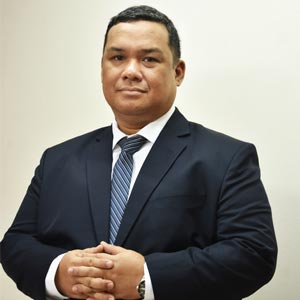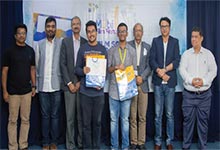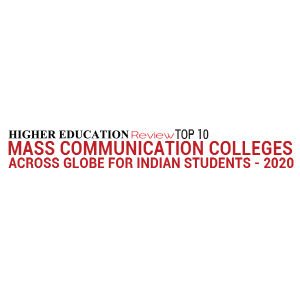
University of Liberal Arts Bangladesh (ULAB): Striving For Consistent Improvement Through Innovation
By Prof. Jude William Genilo, Head of the Media Studies and Journalism Department
The demand for institutions that can offer top-notch mass communication programs has been increasing in demand for the past decade or so. The constant rise in the need for capable professionals especially in the media and journalism sector has been the key factor that has been driving this growth. The University of Liberal Arts Bangladesh (ULAB) has been consistently churning out professionals that has been creating a name for themselves in the global mass communication segment.
ULAB’s founder, Kazi Shahid Ahmed, believes in pursuing endeavours that benefit the people of Bangladesh and are of service to the country. In this spirit, he created a place of learning where wellrounded students would be fully steeped in the values of their own heritage yet trained to face the modern global workplace. ULAB is an institution devoted to developing young minds to their fullest potential through the free and creative pursuit of knowledge.
It is firmly committed to helping young men and women to become responsible and caring citizens of their nations and the world. It fulfills these aims by adopting an array of traditional and innovative academic and extra-curricular programs, and by bringing to students the best that has been accomplished in arts and science throughout the world.
ULAB strives to instil in students a high capacity for analytical thought, lucid expression and a lifelong love of learning. It collaborates across disciplines and institutions to be a centre of knowledge creation. It focuses on sustainable development to create a better world and nurtures graduates who are able to think critically and communicate effectively; who are technologically sophisticated and globally aware.
Imbued deeply with the principles of freedom, creativity, and service, ULAB graduates will become thoughtful, productive members of society who are capable of meeting challenges of the new century. “Following our founder's vision, ULAB sees itself as a partner in community and nation building. It is an open system that produces graduates who would matter to the profession and graduates who would make a contribution to their society.
The university proudly displays its orientation for developing broad knowledge among its students, which is essential for possessing critical, analytical and problem-solving abilities. It looks to research that is applied and useful whether for media studies, sustainable development, entrepreneurship, social concern, language development and archaeological discoveries”, speaks Prof. Jude William Genilo, Head of the Media Studies and Journalism Department, University of Liberal Arts Bangladesh (ULAB).
Apart from the Masters of communication and Bachelor of Social Science, Media Studies and Journalism courses, ULAB also offers programs in BBA, MBA, BA and MA in English, BSc in computer science and engineering and BSc in electrical and electronic engineering. Adding about the mass communication program offered at the University, Prof. Jude says, “So, why should a student choose to study in our department. The first reason is that our program is market-centric. It is focused on high graduate employability.
The second reason is that it is hands-on. Although there is a theoretical portion, most courses aim for practical skill development. The third reason is that the program gives equal focus to co-curriculum activities. It has apprenticeship programs where industry experts’ mentor our students. The apprenticeship programs offer the students an opportunity to work in our various initiatives such as Radio Campbuzz, ULAB TV, Cinemascope, Shutterbugs, and Animation Studio to mention a few. Usually, when media organizations screen job applicants, they request for a portfolio.
In light of this, our undergraduate students are required to undertake 16 practical projects to build up their media portfolios, which will address the need to gain necessary skills. In their final term, the students' portfolio will be judged by a panel - consisting of an alumnus, a teacher and the students' adviser”. The portfolio is required on top of an internship, where students experience the actual workplace for eight to twelve weeks.
In the Masters in Communication program, students need to work on their thesis for several terms. It starts with the idea inquiry where a reflexive approach is utilized, that is, the thesis should be a reflection of the student and not of the faculty. With a topic, students undergo two types of mentorship - joint mentorship and specialized mentorship.
In this manner, the student receives feedback from several faculty and not just one. In the thesis presentation and defense, the student will face a panel consisting of not just teachers but alumni and industry people as well. Through this process, the department is confident that it produces graduates who will make an impact in industry.
With close contact with industry practitioners, civil society, media scholars, and alumni, ULAB has developed unique academic programs that cater to the need for skilled professionals. While most other universities in the country take a more pragmatic approach when it comes to innovation, ULAB has never shied away from taking bold decisions and incorporating innovative teaching pedagogies into their curriculum.
ULAB’s Media Studies and Journalism Department has undergraduate study concentrations in digital journalism, digital television and film production, public relations and communication for development. Using practical and hands-on pedagogies, the University has endeavoured to ensure that their graduates have the necessary traditional, specialized and new skills.

ULAB also strives to develop better programs and approaches to achieve critical thinking and affective learning outcomes. The programs offered at the University are full of innovations that ensure that their graduates are capable of creating an impact in the profession and in society as a whole. Due to the innovative approaches of the department, ULAB entered the World's Universities with Real Impacts (WURI) Ranking in 2020, given by the Hanseatic League of Universities.
ULAB is committed to the new paradigm of learning with a view that education is market-centric and technology-driven; a belief that learning is student-centric and lifelong; a conviction that universities must produce graduates who create an impact in the profession and society. From its inception, the University has turned its back on the traditional approach to education where the learning process is dependent solely on faculty's knowledge, where learning is largely focused at the theoretical level, where communication gaps exist between the university and the industry. By bridging this gap, ULAB is aiming to realize their vision of being the best university in Bangladesh and a leader in South Asia. For more information, please visit ulab.edu.bd
Before joining ULAB, Prof. Jude William Genilo headed the postgraduate program of the prestigious LSPR Communication and Business Institute in Jakarta, Indonesia and served as a research fellow at the Kasetsart University Research and Development Institute (KURDI) in Bangkok, Thailand. He is author of the book, Community-Based Communication: A New Approach to Development Communication and co-editor (with Brian Shoesmith) of the anthology, Bangladesh’s Changing Mediascape: From State Control to Market Forces.
ULAB’s founder, Kazi Shahid Ahmed, believes in pursuing endeavours that benefit the people of Bangladesh and are of service to the country. In this spirit, he created a place of learning where wellrounded students would be fully steeped in the values of their own heritage yet trained to face the modern global workplace. ULAB is an institution devoted to developing young minds to their fullest potential through the free and creative pursuit of knowledge.
It is firmly committed to helping young men and women to become responsible and caring citizens of their nations and the world. It fulfills these aims by adopting an array of traditional and innovative academic and extra-curricular programs, and by bringing to students the best that has been accomplished in arts and science throughout the world.
Focusing on Nurturing Inspired Leaders
ULAB strives to instil in students a high capacity for analytical thought, lucid expression and a lifelong love of learning. It collaborates across disciplines and institutions to be a centre of knowledge creation. It focuses on sustainable development to create a better world and nurtures graduates who are able to think critically and communicate effectively; who are technologically sophisticated and globally aware.
Imbued deeply with the principles of freedom, creativity, and service, ULAB graduates will become thoughtful, productive members of society who are capable of meeting challenges of the new century. “Following our founder's vision, ULAB sees itself as a partner in community and nation building. It is an open system that produces graduates who would matter to the profession and graduates who would make a contribution to their society.
The university proudly displays its orientation for developing broad knowledge among its students, which is essential for possessing critical, analytical and problem-solving abilities. It looks to research that is applied and useful whether for media studies, sustainable development, entrepreneurship, social concern, language development and archaeological discoveries”, speaks Prof. Jude William Genilo, Head of the Media Studies and Journalism Department, University of Liberal Arts Bangladesh (ULAB).
Apart from the Masters of communication and Bachelor of Social Science, Media Studies and Journalism courses, ULAB also offers programs in BBA, MBA, BA and MA in English, BSc in computer science and engineering and BSc in electrical and electronic engineering. Adding about the mass communication program offered at the University, Prof. Jude says, “So, why should a student choose to study in our department. The first reason is that our program is market-centric. It is focused on high graduate employability.
The second reason is that it is hands-on. Although there is a theoretical portion, most courses aim for practical skill development. The third reason is that the program gives equal focus to co-curriculum activities. It has apprenticeship programs where industry experts’ mentor our students. The apprenticeship programs offer the students an opportunity to work in our various initiatives such as Radio Campbuzz, ULAB TV, Cinemascope, Shutterbugs, and Animation Studio to mention a few. Usually, when media organizations screen job applicants, they request for a portfolio.
In light of this, our undergraduate students are required to undertake 16 practical projects to build up their media portfolios, which will address the need to gain necessary skills. In their final term, the students' portfolio will be judged by a panel - consisting of an alumnus, a teacher and the students' adviser”. The portfolio is required on top of an internship, where students experience the actual workplace for eight to twelve weeks.
“ULAB strives to instil in students a high capacity for analytical thought, lucid expression and a lifelong love of learning”
Standing out from the rest in Masters in Communication Thesis
In the Masters in Communication program, students need to work on their thesis for several terms. It starts with the idea inquiry where a reflexive approach is utilized, that is, the thesis should be a reflection of the student and not of the faculty. With a topic, students undergo two types of mentorship - joint mentorship and specialized mentorship.
In this manner, the student receives feedback from several faculty and not just one. In the thesis presentation and defense, the student will face a panel consisting of not just teachers but alumni and industry people as well. Through this process, the department is confident that it produces graduates who will make an impact in industry.
With close contact with industry practitioners, civil society, media scholars, and alumni, ULAB has developed unique academic programs that cater to the need for skilled professionals. While most other universities in the country take a more pragmatic approach when it comes to innovation, ULAB has never shied away from taking bold decisions and incorporating innovative teaching pedagogies into their curriculum.
ULAB’s Media Studies and Journalism Department has undergraduate study concentrations in digital journalism, digital television and film production, public relations and communication for development. Using practical and hands-on pedagogies, the University has endeavoured to ensure that their graduates have the necessary traditional, specialized and new skills.

Officials, jury members and guests of the Dhaka International Mobile Film Festival (DIMFF) 2018 Edition - organized by the department's apprenticeship program Cinemascope.
ULAB also strives to develop better programs and approaches to achieve critical thinking and affective learning outcomes. The programs offered at the University are full of innovations that ensure that their graduates are capable of creating an impact in the profession and in society as a whole. Due to the innovative approaches of the department, ULAB entered the World's Universities with Real Impacts (WURI) Ranking in 2020, given by the Hanseatic League of Universities.
ULAB is committed to the new paradigm of learning with a view that education is market-centric and technology-driven; a belief that learning is student-centric and lifelong; a conviction that universities must produce graduates who create an impact in the profession and society. From its inception, the University has turned its back on the traditional approach to education where the learning process is dependent solely on faculty's knowledge, where learning is largely focused at the theoretical level, where communication gaps exist between the university and the industry. By bridging this gap, ULAB is aiming to realize their vision of being the best university in Bangladesh and a leader in South Asia. For more information, please visit ulab.edu.bd
Prof. Jude William Genilo, Head of the Media Studies and Journalism Department
Before joining ULAB, Prof. Jude William Genilo headed the postgraduate program of the prestigious LSPR Communication and Business Institute in Jakarta, Indonesia and served as a research fellow at the Kasetsart University Research and Development Institute (KURDI) in Bangkok, Thailand. He is author of the book, Community-Based Communication: A New Approach to Development Communication and co-editor (with Brian Shoesmith) of the anthology, Bangladesh’s Changing Mediascape: From State Control to Market Forces.

